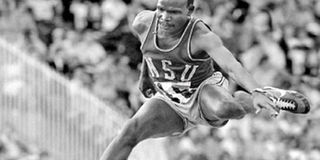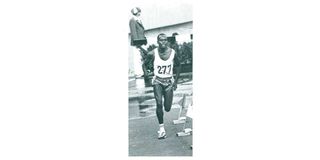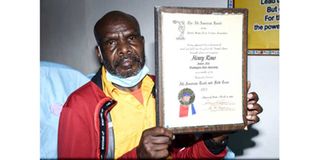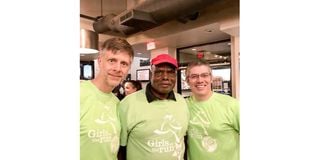
Kenyan distance running legend Henry Rono.
If the 1978 season was the best for Henry Rono who simply blew away everything thrown on his way with four world records in 12 weeks, 1982 was the final comeback year for the runner when everybody had written him off.
One race was to define Rono - an arranged meeting against American long-distance runner Alberto Salazar who bluffed, threatened, and even bribed Rono to race him after the Kenyan had grown cold feet.
Rono had accepted the invite with a handsome appearance fee to help Salazar's bid to break the 10,000m US record on April 10, 1982, but later refused to show up. Threats and bluffs paid off, given that the American had planned to break the American 10,000m record while being paced by Rono.
“Race day was cold, wet, and windy. An overweight Henry Rono would face one of the in-form runners in the world. Rono’s only real form guide was over 5,000metres the week before at Stanford. Second place, over 30 seconds slower than his world record was not exactly encouraging,” retired Australian runner Richard Amery in athletics blog letsrun.com four years ago, reflecting on Rono's ability to turn desperate situations positively to his advantage.
A field of 14 started the race, but it was obvious early on who the race was really between. Rono led at the first mile in four minutes, 27.1 seconds, and by just over halfway way it was a race in two. Salazar was in front pushing the pace, but Rono just would not go away.

Legendary athlete Henry Rono during an interview at his home in Kaptargon village, Nandi County on April 07, 2021.
“With just over a lap to go, he went to the lead, but this time it was Salazar’s turn to hang on. In the final straight, he narrowly took the lead, but Rono would not be denied. Beer belly or not, he held on for the narrowest of victories – 27:29.9 to 27:30.0,” Amery wrote.
Rono would later say that it was the hardest race he ever ran. The simple fact is, that in adverse conditions; overweight, and only a shadow of his former self, he had come within eight seconds of his world record as a clear demonstration that indeed Rono was blessed and special.
This achievement remains a footnote in a career best remembered in the summer of 1978 when he set four world records in four different events in 81 days at the youthful age of 26 while still a student-athlete at Washington State University under the tutelage of coach John Chaplin.
It all started on April 8 when Rono became the first human being to dip under 13 minutes 10 seconds in the men’s 5,000m with a record of 13:08.4 during a double dual meet against Arizona State and California in Berkeley, the same place where he demolished the previous record of 13:12.8 by Dutch-born New Zealand runner Dick Quax.
On May 13, Rono eclipsed the steeplechase record by running 8:05.4 at the Northwest Relays in Seattle, relegating the previous record of 8:08.0, of Anders Gärderud to the history books. Rono’s record would last for 11 years before another Kenyan, Peter Koech, set a new mark. 8:04.35.

Henry Rono during a past race.
However, no collegian has come within even 10 seconds of Rono's NCAA record to this day — 46 years later.
Emblonded by his form, and with meet promoters chasing his signature, Rono began the European leg of his world record tour and on June 11 in Vienna, Austria. He ran 27:22:47 to become the first man in history to dip under 27:30 over 10,000m, faster than the previous record of 27:30.5 held by his compatriot Samson Kimobwa.
As sure as he was ahead of his time, Rono’s record would last for more than six years.
Rono set his fourth world record in 1978 of 7:32.1 over 3,000m, besting the previous record of 7:35.2 set by Briton Brendan Foster at the Bislett Games in Oslo.

Legendary athlete Henry Rono displays a recognition certificate he was given in 1977, during an interview at his home in Kaptargon village, Nandi County on April 07, 2021.
In total Rono, whose winning streak reached 31 races in 1978, was on another level that year. He broke two NCAA meet records in the prelims of the 1978 NCAA Outdoor Track and Field Championships in Eugene.
He ran 13:21.79 in the 5,000m (supposedly while jogging the curves and sprinting the straightaways), and 8:18.63 in the 3,000m steeplechase on the same day.
The latter mark was a meet record by six seconds, and he took another six seconds off the record in the final (8:12.39). Rono didn’t run the 5,000m or 10,000m final as Chaplin scratched him out of concern with a sore foot.
Away from the track, Rono was doing serious stuff in the cross-country scene. He won three NCAA cross-country champion championships in 1976, 1977, and 1979 after missing out on the trophy in 1978 on a cold, snow-covered course in Madison after he ran off-course mid-race.
Since Kenya boycotted both the 1976 (Montreal, Canada) and 1980 (Moscow) Olympics, Rono never achieved Olympic fame but he did win two Commonwealth Games titles and All-Africa Games (renamed African Games) titles in 1978.

Kenyan athletics legend Henry Rono (centre).
Rono never achieved the same success that he hit in 1978 as he struggled with a drinking problem for much of his adult life, but he did set another world record in 1981 when he lowered his own 5,000m record to 13:06.20.
“It was a remarkable feat as early in the year Rono had such a large beer gut and was in such poor form that it was hard for him to get into meets. On July 7, he even ran 15:40 for 5,000m, but he quickly raced himself into shape and just over two months later, on September 13, he ran 13:06.20. Making the feat all the more incredible is the fact he reportedly got drunk the night before the race, but ran off his hangover with an hour-long run the morning of the race,” wrote Amery.
When Rono won the first of his three NCAA titles, his friend Mike Kosgei was always on the sidelines. Recalled Chapman: “That’s something. I think you can safely say it will never be done again.”
“It was nothing short of stupefying. But then, so were his early workouts upon arriving in Pullman after the 1976 African boycott of the Montreal Olympics at least as remembered by former teammate Phil English, according to the Seattle Times recently.
“You have to remember he hadn’t trained after the boycott — I mean, what for, right?” said English, a coaching fixture in Yakima for four decades. “So we’re doing a workout of 800-meter intervals — eight times 800, I think — and he’s kind of trailing the other Kenyans, maybe 20 metres back.”
Rono’s achievements are immortalised in the book ‘The Five and Ten Men: Ten Men Who Defined Distance Running’ by Amery.
The book looks at the careers of those ten men, the eras in which they competed, the types of training they undertook, and their lives outside of their sporting careers. As such, it is of interest for the social and political times in which they lived in addition to their purely sporting achievements.
Rono’s capacity for training truly came into focus during that sensational 1978 season.
Rono broke his first world record on April 8 of that year in a double-dual meet against Arizona State and Cal in Berkeley, running the 5,000m in 13 minutes, 8.4 seconds. A month later at the rainy Northwest Relays in Seattle, he shattered the 3,000-meter steeplechase mark by running 8:05.4 — a world record that lasted for 11 years and still stands as the collegiate record.
When his season moved to Europe, Rono took down the 10,000m record in 27:22.5 — the first man under 27:30 — in Vienna, and two weeks later added the flat 3,000 mark in 7:32.1 in Oslo, Norway.
It was all part of a 31-race winning streak at those and other distances, which included two NCAA meet records on the same day in Eugene in preliminary races of the 5,000m and 3,000m steeplechase.
“Some of it was overwhelming,” he would tell an interviewer from The Spokesman Review years later.
Given his start in the sport, it had to be.
Rono grew up in Kiptaragon, a village among the farms in Kenya’s Nandi Hills. His father died before Rono turned 10, and his mother struggled to afford to keep him in school. He didn’t begin running in earnest until age 19 upon seeing national hero Kipchoge Keino make an appearance at a stadium.
Five years later, he made the 1976 Kenyan Olympic team — only to see African nations pull out at the eleventh hour.
But it was there in Montreal that a phone call was placed to Chaplin by two of his Kenyan athletes, John and Kip Ngeno, wondering if he might be interested in “our third steeplechaser.”
“Are you kidding?” Chaplin said. “ ‘Of course I would. It was not exactly a recruiting coup on my part.”
Rono put on the WSU singlet for the first time that October in a low-key cross-country dual in Missoula — and promptly knocked 35 seconds off the 4-mile course record teammate Joshua Kimeto had set two years before.
His Cougar resume includes those three NCAA cross-country titles, two more in indoor track — most notably the 2-mile in 1977 when WSU won its lone national championship — and steeplechase titles outdoors in
1978 and 1979. A six-time All-American, he set seven collegiate records and has seven school records that still stand.
“He was such a powerful guy — big barrel chest — and incredibly efficient,” English said. “The incredible thing about those world records is the versatility it takes — the speed for the 3,000m and the skill of the steeplechase and then the far reaches of the 10,000m. You just don’t see that kind of range.”
And as Chaplin noted, “He never got rattled.”
But that indomitable streak couldn’t hold up to politics or personal demons.
Another boycott of the Soviet-hosted 1980 Olympics cost Rono likely his last chance at medals, and he was souring on interactions with international track officials, the Kenyan federation, and agents.
His issues with alcohol that surfaced in college began to grow, though his ability to power through them was revealed in one last competitive hurrah.
In May 1982, Rono won the Lilac Bloomsday Run in Spokane, chugging through the 12km — he would admit later — with a powerful hangover. When he headed to Europe to run that summer, he did so with a pronounced beer gut that had meet promoters reticent to have him race. In July 1982 in a 5,000m race in Finland, Rono was lapped and he failed to break 15:40.
Yet he somehow raced himself back into shape in meets across the continent, and by September, broke his 5,000m world record in a race in Knarvik, Norway.









